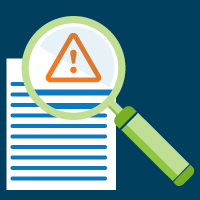5 Hidden Risks of Your Inaccessible Website
Governments around the world mandate an accessible web experience for regulated industries, and you can be fined heavily for non-compliance. In the United States, the Department of Justice has the authority to seek civil penalties for a first violation of the Americans With Disabilities Act (ADA) at $96,384 and up to $192,768 for each subsequent violation. And in the event a site is not subject to regulation, it may well be tested in court. Since 2018, more than 4,000 ADA-based digital accessibility lawsuits have been filed in federal and state courts each year from 2021 to 2023 (targeting companies both large and small). Many thousands more companies receive a demand letter that leads to a settlement to avoid a trial.
When you recognize that an inaccessible website excludes your users from making transactions, you start to see the barriers inherent to the design and coding. Is your content perceivable, operable, understandable, and robust? Failure to deliver text, graphics, videos, and essential forms to all your visitors is the basis for this whole discussion.
You know about the potential for legal consequences. Yet there are hidden risks that can affect your company if you fail to conform to website accessibility standards. These risks may even add up to greater costs than government fines or civil litigation. If you decide to ignore web accessibility requirements, you should be prepared to accept these hidden risks as well.
Inaccessible Websites Can Harm the Content Owner
1. Brand Damage 
People with disabilities represent a growing demographic. As much as 27% of the U.S. population has a disability, and the voice of persons with disabilities is gaining momentum. Add to this number an aging customer base that means more and more of your website visitors will have physical limitations. Age is a trend that will not decline. Companies that willfully ignore the needs of these groups are sure to suffer damage to their brands and reputations.
2. Missed Market Opportunities
Similarly, if your website isn’t accessible, you risk missing out on opportunities to gain more customers and increase revenue. Competitors who have accessible websites will easily reap the increasing numbers of persons with disabilities—simply because those customers can’t use your website.
On the other hand, if you’re one of the first in your industry to become web accessible, you can win customers who couldn’t use your competitors’ inaccessible websites. Why limit your audience?
3. Avoidance Tailspin
Many companies choose to throw money at a problem, hoping for a quick fix over a real and sustainable solution. They hire lawyers to deal with legal claims and spend hundreds of hours diverting their staff to field consumer complaints. Because these patchwork solutions draw significant company resources, investing in a permanent solution seems too costly.
So these companies continue to deal with legal problems and new consumer complaints in the same manner. They risk entering a tailspin that demands more time and money, and they move farther away from the real solution that could end the constant problem management. Instead, consider the benefits of shifting left, or building accessibility into your product development, which can reduce those unhappy visitors and set you on a path that excludes no one.
4. A Weaker Organization
With the avoidance tailspin comes the risk of opportunity cost. By dumping money into costly patchwork solutions, companies risk the opportunity to invest budget into product and process improvements–improvements that could lead to better sales and a healthier business.
5. Less Qualified Employees
Companies that don’t have an accessible infrastructure take personnel risks as well. The marketplace is loaded with bright, talented individuals with disabilities. But if these job candidates can’t even apply because your system isn’t accessible, your company has lost the opportunity to become a stronger organization, and you risk settling for lesser talent.
Key Takeaways
Making your digital products accessible simply makes good business sense. Achieving accessibility benefits everyone, it’s viable, and it’s less costly than taking the risk of willful inaccessibility.
Whether it’s brand damage or missed market opportunities, avoidance tailspin, or weakening the organization, even excluding the full talent pool — or all of the above — ignoring is risky business.
Next Steps
- Download our Website Accessibility Checklist.
- Start your accessibility project off on the right foot. Find out which tools and services are right for you.
- Sign up for a webinar on accessibility.
